Zili Zhang
TokenLake: A Unified Segment-level Prefix Cache Pool for Fine-grained Elastic Long-Context LLM Serving
Aug 24, 2025



Abstract:Prefix caching is crucial to accelerate multi-turn interactions and requests with shared prefixes. At the cluster level, existing prefix caching systems are tightly coupled with request scheduling to optimize cache efficiency and computation performance together, leading to load imbalance, data redundancy, and memory fragmentation of caching systems across instances. To address these issues, memory pooling is promising to shield the scheduler from the underlying cache management so that it can focus on the computation optimization. However, because existing prefix caching systems only transfer increasingly longer prefix caches between instances, they cannot achieve low-latency memory pooling. To address these problems, we propose a unified segment-level prefix cache pool, TokenLake. It uses a declarative cache interface to expose requests' query tensors, prefix caches, and cache-aware operations to TokenLake for efficient pooling. Powered by this abstraction, TokenLake can manage prefix cache at the segment level with a heavy-hitter-aware load balancing algorithm to achieve better cache load balance, deduplication, and defragmentation. TokenLake also transparently minimizes the communication volume of query tensors and new caches. Based on TokenLake, the scheduler can schedule requests elastically by using existing techniques without considering prefix cache management. Evaluations on real-world workloads show that TokenLake can improve throughput by up to 2.6$\times$ and 2.0$\times$ and boost hit rate by 2.0$\times$ and 2.1$\times$, compared to state-of-the-art cache-aware routing and cache-centric PD-disaggregation solutions, respectively.
Step-Audio-AQAA: a Fully End-to-End Expressive Large Audio Language Model
Jun 10, 2025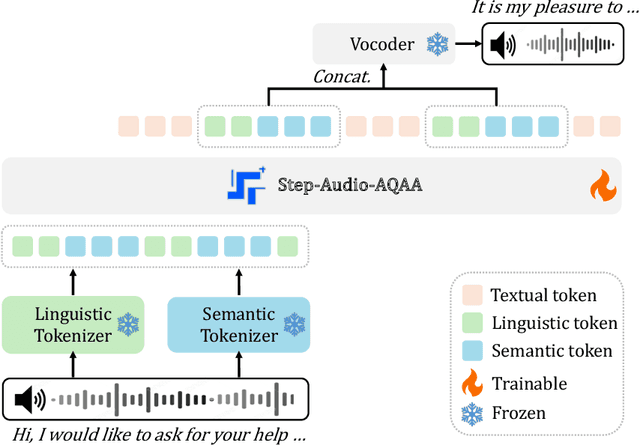
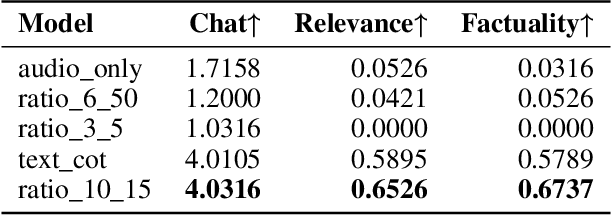
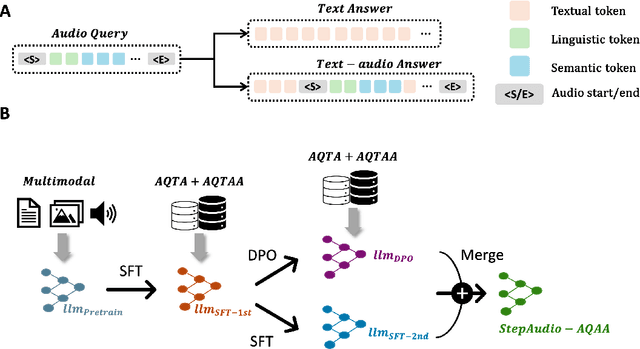

Abstract:Large Audio-Language Models (LALMs) have significantly advanced intelligent human-computer interaction, yet their reliance on text-based outputs limits their ability to generate natural speech responses directly, hindering seamless audio interactions. To address this, we introduce Step-Audio-AQAA, a fully end-to-end LALM designed for Audio Query-Audio Answer (AQAA) tasks. The model integrates a dual-codebook audio tokenizer for linguistic and semantic feature extraction, a 130-billion-parameter backbone LLM and a neural vocoder for high-fidelity speech synthesis. Our post-training approach employs interleaved token-output of text and audio to enhance semantic coherence and combines Direct Preference Optimization (DPO) with model merge to improve performance. Evaluations on the StepEval-Audio-360 benchmark demonstrate that Step-Audio-AQAA excels especially in speech control, outperforming the state-of-art LALMs in key areas. This work contributes a promising solution for end-to-end LALMs and highlights the critical role of token-based vocoder in enhancing overall performance for AQAA tasks.
Label-efficient Single Photon Images Classification via Active Learning
May 07, 2025Abstract:Single-photon LiDAR achieves high-precision 3D imaging in extreme environments through quantum-level photon detection technology. Current research primarily focuses on reconstructing 3D scenes from sparse photon events, whereas the semantic interpretation of single-photon images remains underexplored, due to high annotation costs and inefficient labeling strategies. This paper presents the first active learning framework for single-photon image classification. The core contribution is an imaging condition-aware sampling strategy that integrates synthetic augmentation to model variability across imaging conditions. By identifying samples where the model is both uncertain and sensitive to these conditions, the proposed method selectively annotates only the most informative examples. Experiments on both synthetic and real-world datasets show that our approach outperforms all baselines and achieves high classification accuracy with significantly fewer labeled samples. Specifically, our approach achieves 97% accuracy on synthetic single-photon data using only 1.5% labeled samples. On real-world data, we maintain 90.63% accuracy with just 8% labeled samples, which is 4.51% higher than the best-performing baseline. This illustrates that active learning enables the same level of classification performance on single-photon images as on classical images, opening doors to large-scale integration of single-photon data in real-world applications.
StreamRL: Scalable, Heterogeneous, and Elastic RL for LLMs with Disaggregated Stream Generation
Apr 22, 2025Abstract:Reinforcement learning (RL) has become the core post-training technique for large language models (LLMs). RL for LLMs involves two stages: generation and training. The LLM first generates samples online, which are then used to derive rewards for training. The conventional view holds that the colocated architecture, where the two stages share resources via temporal multiplexing, outperforms the disaggregated architecture, in which dedicated resources are assigned to each stage. However, in real-world deployments, we observe that the colocated architecture suffers from resource coupling, where the two stages are constrained to use the same resources. This coupling compromises the scalability and cost-efficiency of colocated RL in large-scale training. In contrast, the disaggregated architecture allows for flexible resource allocation, supports heterogeneous training setups, and facilitates cross-datacenter deployment. StreamRL is designed with disaggregation from first principles and fully unlocks its potential by addressing two types of performance bottlenecks in existing disaggregated RL frameworks: pipeline bubbles, caused by stage dependencies, and skewness bubbles, resulting from long-tail output length distributions. To address pipeline bubbles, StreamRL breaks the traditional stage boundary in synchronous RL algorithms through stream generation and achieves full overlapping in asynchronous RL. To address skewness bubbles, StreamRL employs an output-length ranker model to identify long-tail samples and reduces generation time via skewness-aware dispatching and scheduling. Experiments show that StreamRL improves throughput by up to 2.66x compared to existing state-of-the-art systems, and improves cost-effectiveness by up to 1.33x in a heterogeneous, cross-datacenter setting.
Step-Audio: Unified Understanding and Generation in Intelligent Speech Interaction
Feb 18, 2025Abstract:Real-time speech interaction, serving as a fundamental interface for human-machine collaboration, holds immense potential. However, current open-source models face limitations such as high costs in voice data collection, weakness in dynamic control, and limited intelligence. To address these challenges, this paper introduces Step-Audio, the first production-ready open-source solution. Key contributions include: 1) a 130B-parameter unified speech-text multi-modal model that achieves unified understanding and generation, with the Step-Audio-Chat version open-sourced; 2) a generative speech data engine that establishes an affordable voice cloning framework and produces the open-sourced lightweight Step-Audio-TTS-3B model through distillation; 3) an instruction-driven fine control system enabling dynamic adjustments across dialects, emotions, singing, and RAP; 4) an enhanced cognitive architecture augmented with tool calling and role-playing abilities to manage complex tasks effectively. Based on our new StepEval-Audio-360 evaluation benchmark, Step-Audio achieves state-of-the-art performance in human evaluations, especially in terms of instruction following. On open-source benchmarks like LLaMA Question, shows 9.3% average performance improvement, demonstrating our commitment to advancing the development of open-source multi-modal language technologies. Our code and models are available at https://github.com/stepfun-ai/Step-Audio.
RAGCache: Efficient Knowledge Caching for Retrieval-Augmented Generation
Apr 18, 2024



Abstract:Retrieval-Augmented Generation (RAG) has shown significant improvements in various natural language processing tasks by integrating the strengths of large language models (LLMs) and external knowledge databases. However, RAG introduces long sequence generation and leads to high computation and memory costs. We propose Thoth, a novel multilevel dynamic caching system tailored for RAG. Our analysis benchmarks current RAG systems, pinpointing the performance bottleneck (i.e., long sequence due to knowledge injection) and optimization opportunities (i.e., caching knowledge's intermediate states). Based on these insights, we design Thoth, which organizes the intermediate states of retrieved knowledge in a knowledge tree and caches them in the GPU and host memory hierarchy. Thoth proposes a replacement policy that is aware of LLM inference characteristics and RAG retrieval patterns. It also dynamically overlaps the retrieval and inference steps to minimize the end-to-end latency. We implement Thoth and evaluate it on vLLM, a state-of-the-art LLM inference system and Faiss, a state-of-the-art vector database. The experimental results show that Thoth reduces the time to first token (TTFT) by up to 4x and improves the throughput by up to 2.1x compared to vLLM integrated with Faiss.
Iterative Refinement of Project-Level Code Context for Precise Code Generation with Compiler Feedback
Apr 02, 2024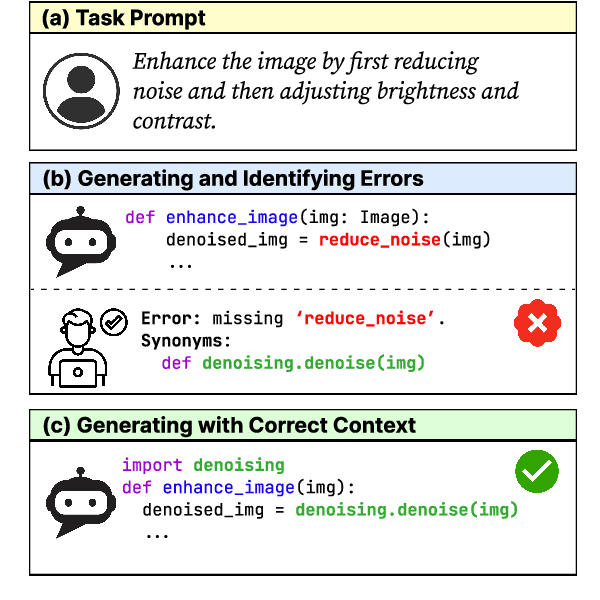

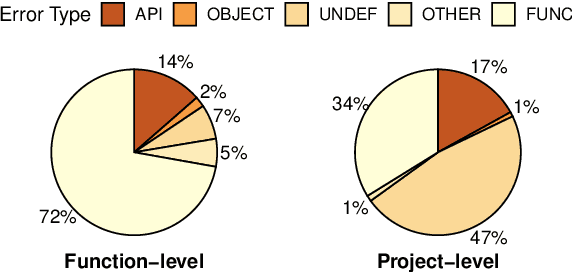
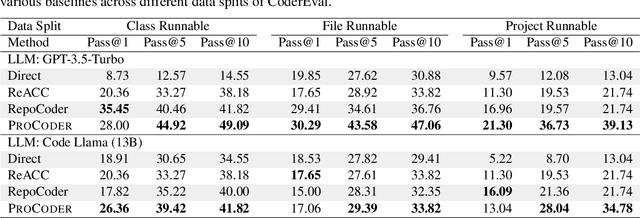
Abstract:Large language models (LLMs) have shown remarkable progress in automated code generation. Yet, incorporating LLM-based code generation into real-life software projects poses challenges, as the generated code may contain errors in API usage, class, data structure, or missing project-specific information. As much of this project-specific context cannot fit into the prompts of LLMs, we must find ways to allow the model to explore the project-level code context. To this end, this paper puts forward a novel approach, termed ProCoder, which iteratively refines the project-level code context for precise code generation, guided by the compiler feedback. In particular, ProCoder first leverages compiler techniques to identify a mismatch between the generated code and the project's context. It then iteratively aligns and fixes the identified errors using information extracted from the code repository. We integrate ProCoder with two representative LLMs, i.e., GPT-3.5-Turbo and Code Llama (13B), and apply it to Python code generation. Experimental results show that ProCoder significantly improves the vanilla LLMs by over 80% in generating code dependent on project context, and consistently outperforms the existing retrieval-based code generation baselines.
Fast Distributed Inference Serving for Large Language Models
May 10, 2023Abstract:Large language models (LLMs) power a new generation of interactive AI applications exemplified by ChatGPT. The interactive nature of these applications demand low job completion time (JCT) for model inference. Existing LLM serving systems use run-to-completion processing for inference jobs, which suffers from head-of-line blocking and long JCT. We present FastServe, a distributed inference serving system for LLMs. FastServe exploits the autoregressive pattern of LLM inference to enable preemption at the granularity of each output token. FastServe uses preemptive scheduling to minimize JCT with a novel skip-join Multi-Level Feedback Queue scheduler. Based on the new semi information-agnostic setting of LLM inference, the scheduler leverages the input length information to assign an appropriate initial queue for each arrival job to join. The higher priority queues than the joined queue are skipped to reduce demotions. We design an efficient GPU memory management mechanism that proactively offloads and uploads intermediate states between GPU memory and host memory for LLM inference. We build a system prototype of FastServe based on NVIDIA FasterTransformer. Experimental results show that compared to the state-of-the-art solution Orca, FastServe improves the average and tail JCT by up to 5.1$\times$ and 6.4$\times$, respectively.
Multi-View Multi-Instance Multi-Label Learning based on Collaborative Matrix Factorization
May 15, 2019



Abstract:Multi-view Multi-instance Multi-label Learning(M3L) deals with complex objects encompassing diverse instances, represented with different feature views, and annotated with multiple labels. Existing M3L solutions only partially explore the inter or intra relations between objects (or bags), instances, and labels, which can convey important contextual information for M3L. As such, they may have a compromised performance. In this paper, we propose a collaborative matrix factorization based solution called M3Lcmf. M3Lcmf first uses a heterogeneous network composed of nodes of bags, instances, and labels, to encode different types of relations via multiple relational data matrices. To preserve the intrinsic structure of the data matrices, M3Lcmf collaboratively factorizes them into low-rank matrices, explores the latent relationships between bags, instances, and labels, and selectively merges the data matrices. An aggregation scheme is further introduced to aggregate the instance-level labels into bag-level and to guide the factorization. An empirical study on benchmark datasets show that M3Lcmf outperforms other related competitive solutions both in the instance-level and bag-level prediction.
An Adaptive Amoeba Algorithm for Shortest Path Tree Computation in Dynamic Graphs
Nov 03, 2013

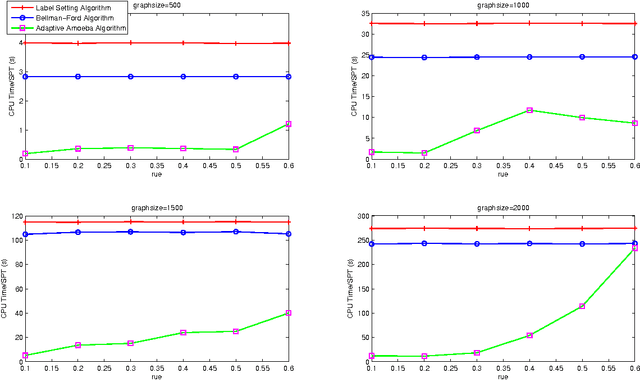
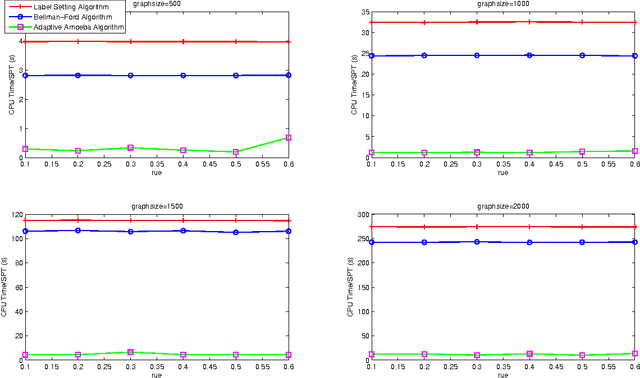
Abstract:This paper presents an adaptive amoeba algorithm to address the shortest path tree (SPT) problem in dynamic graphs. In dynamic graphs, the edge weight updates consists of three categories: edge weight increases, edge weight decreases, the mixture of them. Existing work on this problem solve this issue through analyzing the nodes influenced by the edge weight updates and recompute these affected vertices. However, when the network becomes big, the process will become complex. The proposed method can overcome the disadvantages of the existing approaches. The most important feature of this algorithm is its adaptivity. When the edge weight changes, the proposed algorithm can recognize the affected vertices and reconstruct them spontaneously. To evaluate the proposed adaptive amoeba algorithm, we compare it with the Label Setting algorithm and Bellman-Ford algorithm. The comparison results demonstrate the effectiveness of the proposed method.
 Add to Chrome
Add to Chrome Add to Firefox
Add to Firefox Add to Edge
Add to Edge